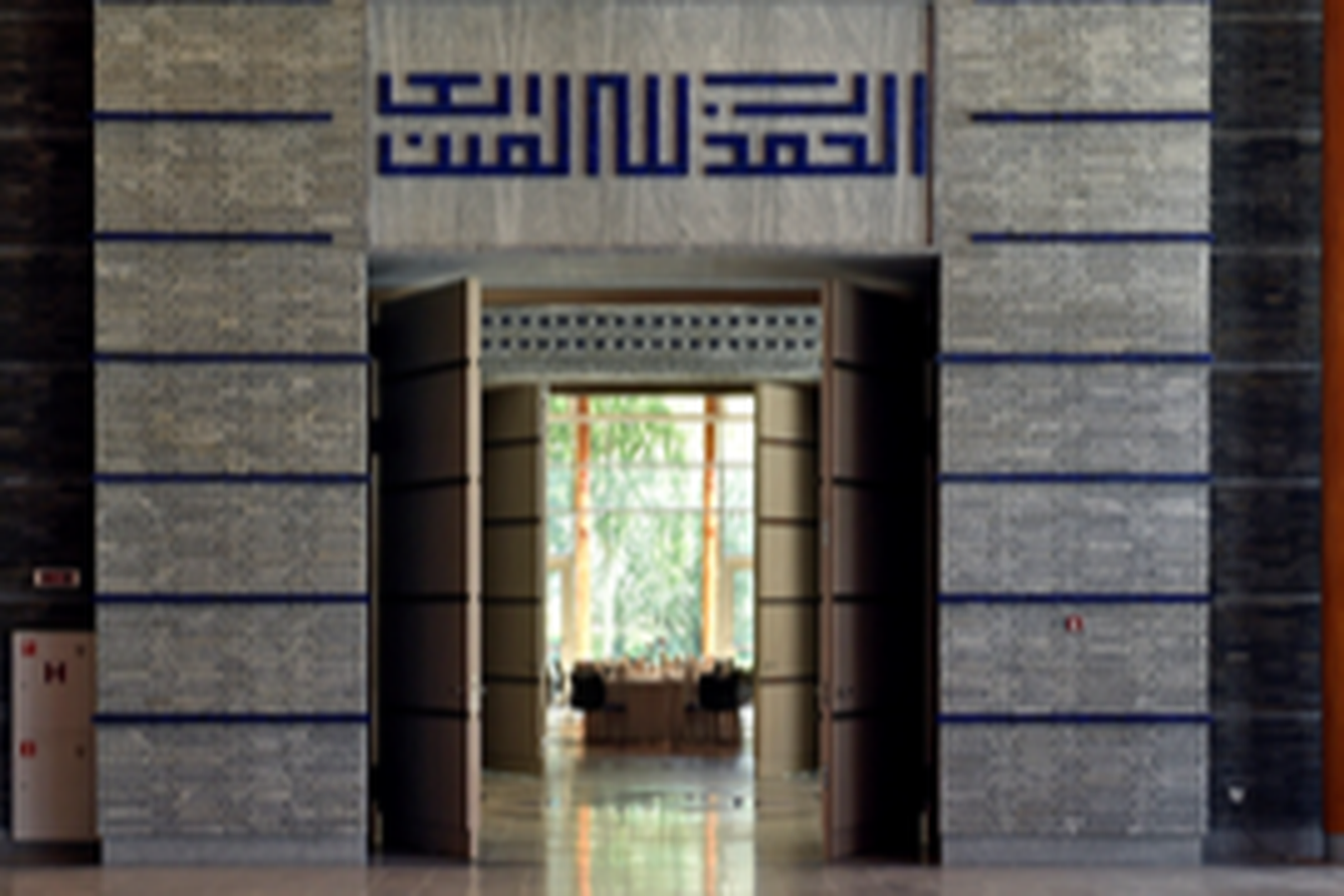
Everyday Phrases From The Holy Qur’an

The social hall portal entrance at the Ismaili Jamatkhana and Centre, Khorog. The geometric Kufic script above the portal reads: “al-hamdu lillahi rabil ‘alamin.”
“From early on, [the Qur’an’s] passages have inspired works of art and architecture, and shaped attitudes and norms that have guided the development of Muslim artistic traditions… Scientific pursuits, philosophic inquiry and artistic endeavour are all seen as the response of the faithful to the recurring call of the Qur’an to ponder the creation as a way to understand Allah's benevolent majesty.”
Mawlana Hazar Imam, London, 2003

The month of Ramadan offers an opportunity to reflect on the blessings of Allah’s guidance to us, through the Holy Qur’an, the life and teachings of Prophet Muhammad (peace be upon him and his family), and the ongoing guidance of the Imamat. During this holy month, in which the first revelation of the Qur’an-e-Sharif was revealed, let us reflect on some of the ways that the Qur’an has influenced our everyday lives.
For Muslims, the Noble Qur’an is reflected in prayers and religious practices, including at times of births, marriages, deaths, and festivals, as well as having been a source of inspiration for a wide range of devotional and artistic expressions, as well as Muslim ethical conduct. It influences art, architecture, scientific thought, literature, philosophy, and has impacted many different dimensions of Muslim life.

Everyday Phrases from the Holy Qur’an
The inspiration from the Holy Qur’an also includes common phrases that allow us to keep the thought of Allah in our minds and His presence in our hearts at all times. Some of the many phrases derived from the Qur’an that feature in the everyday life of Muslims include:
Beginning a task with bismi’l-lahi’r-rahmani’r-rahim (In the Name of God, the Compassionate, the Merciful);
Ending a task with al-hamdu li’l-lah (Praise be to God);
Reciting the phrase insha’llah (God willing) for future undertakings;
Seeking forgiveness through the phrase astaghfiru’l-lah (I seek forgiveness from God);
Glorifying God by the phrase Allahu Akbar (God is Great);
Greeting others by the phrase as-salaamu alaykum (Peace be upon you);
When someone passes away, it is customary to say inna li’l-lahi wa-inna ilayhi raji’un (Indeed to Allah we belong and to Him we shall return).
The Beautiful Names of Allah
Another aspect of the Qur’an that appears in everyday life are “the Beautiful Names” (al-asma al-husna). These refer to the ninety-nine attributes of God, which are recited in various prayers. Some of the common names that are included among these are al-Rahman (the Compassionate), al-Rahim (the Merciful), al-Salam (the Peace), and al-Khaliq (the Creator). The Qur’an in general, and al-asma al-husna in particular, influence the names that Muslims are given. They also find expressions in art and music.
Conclusion
Mawlana Hazar Imam has often reminded us that in Islam, just the thought of Allah is a prayer and a blessing. Invoking Qur’anic language in our everyday lives is a way in which we can regularly connect with the Divine and remember Allah throughout our day.

For Mawlana Hazar Imam’s blessings and guidance on the importance of religious education, learning the meaning of the Qur’an and our prayers, and the importance of the remembrance of Allah, the Jamat is encouraged to read his message from Atlanta, USA on March 17, 2018. It is published on pages 161 to 162 of the Diamond Jubilee (2017-2018) book of Farman Mubarak.
Family Chat Questions
In what ways does the Holy Qur’an permeate different aspects of our lives?
Why do we use such everyday phrases from the Holy Qur’an?
Learn More
Speech: Word of God, Art of Man: The Qur’an and its Creative Expressions, Mawlana Hazar Imam, London, 2003
IIS Secondary Curriculum: Faith and Practice in Islamic Traditions and The Qur’an and its Interpretations
Article: Approaches to the Qur’an, Dr. Shainool Jiwa
Online Readings: The Holy Qur’an (Foundations of Faith series)
Opinions, statements, or other information displayed through external links above are provided as additional reference material and do not necessarily represent the opinions of, or imply endorsement by, the Ismaili Institutions for Canada.


